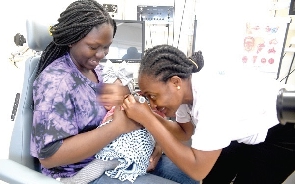One out of two cases of hearing impairment (HI) in babies in the country is due to genetic causes.
Also, one out of three babies with genetic HI has a syndrome, which means they have other conditions in addition to hearing impairment, while one out of four cases of HI in babies is also due to maternal infections acquired during pregnancy, complications after birth and head trauma.
This is contained in a study conducted on hearing impairment dubbed: Hearing impairment genetics studies in Africa (HI-GENES Africa).
The Lead researcher for the study, Elvis Twumasi Aboagye, made this known at the commemoration of this year's World Hearing Day in Accra yesterday.
The ceremony was organised by the West African Centre for Cell Biology of Infectious Pathogens (WACCBIP) on the theme: “Ear and hearing care for all! Let's make it a reality”.
Causes
According to Mr. Aboagye, HI was generally caused by environmental, genetic or hereditary factors, which consisted of syndromic and non-syndromic hearing impairment (NSHI).
He said genetic factors significantly contributed to the burden of HI in the country, adding that there was a high carrier frequency found in healthy persons during their study.
Mr. Aboagye also said that some adult carriers of the gene had no idea about their status and, therefore, called for HI genetic screening to be conducted on people to know their status.
He also said that meningitis had been identified to be the common cause of HI for which effective interventions such as screening at an early stage of a person’s life were crucial.
Mr. Aboagye further said that it was medically necessary for NSHI genetic testing and carrier screening to be considered in pre-marital counselling, as well as individuals with a family history diagnosis of HI.
He said the centre had developed and submitted a policy brief to the government to ensure that the majority of the population was screened for HI.
The Communications Manager at WACCBIP, Andrew Muniru Nantogmah, launched an HI resource pack to educate parents and caretakers on signs to look out for in their children for early detection.
He mentioned some of the signs to include delayed speech, frequent turning up of the TV volume and not following directions.
Others are not startled by loud noises, not turning to the source of a sound after six months of age and not saying a single word by age one
Such children are sometimes being mistaken for not paying attention or just ignoring, but it could be as a result of a partial or complete hearing loss,” Mr Nantogmah added.
A Public Engagement Officer at WACCBIP, Kyerewa Akuamoah Boateng, also said education was crucial to change existing traditional beliefs and myths, some of which claimed that HI was spiritual.
Health News of Monday, 6 March 2023
Source: nine 9
Hearing impairment in babies genetical
Entertainment
















